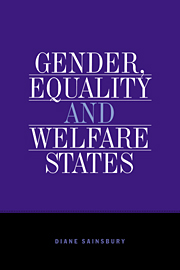Book contents
- Frontmatter
- Contents
- List of figures
- List of tables
- Acknowledgments
- Introduction
- Part I Dimensions of variation
- Part II Bases of entitlement
- 3 The male breadwinner model and women's entitlements as wives
- 4 Women's entitlements as mothers and caregivers
- 5 Women's employment and entitlements as workers
- Part III Stratification and redistributive outcomes
- Part IV Welfare state restructuring
- Notes
- References
- Index
5 - Women's employment and entitlements as workers
Published online by Cambridge University Press: 18 September 2009
- Frontmatter
- Contents
- List of figures
- List of tables
- Acknowledgments
- Introduction
- Part I Dimensions of variation
- Part II Bases of entitlement
- 3 The male breadwinner model and women's entitlements as wives
- 4 Women's entitlements as mothers and caregivers
- 5 Women's employment and entitlements as workers
- Part III Stratification and redistributive outcomes
- Part IV Welfare state restructuring
- Notes
- References
- Index
Summary
Women's massive influx into the labor market during the post-World War II period has often been described as a revolution (Smith 1979, Mott 1982, Fuchs 1988, Esping-Andersen 1990, Lewis 1992b), and dramatic changes in women's labor market status have occurred in all four countries. Women's employment, at least in theory, enhances their social entitlement because labor market status confers a variety of social rights. The centrality of entitlements based on work in the social insurance schemes of many countries and the legitimacy of these entitlements as earned rights have caused feminists to emphasize the necessity of improving women's status and claims as workers through their full integration in the labor force. Current typologies based on the breadwinner model also highlight women's entitlements as workers as the most important dimension of variation between welfare states (Lewis and Ostner 1991, 1995, Lewis 1992a). In effect, the substitution of the male breadwinner model for a universal breadwinner model has been high on the agenda of many feminists (Fraser 1994).
This chapter examines how and to what degree women's labor market participation has altered their entitlement to social benefits. More specifically, to what extent have women workers been included or excluded in social provision through work related schemes? How has women's incorporation varied across the four countries? What policy constructions or mechanisms result in women workers' inclusion or exclusion? Finally, what is the defamilializing impact of women's entitlements as workers? Have such entitlements lessened married women's dependency on benefits based on their husbands' social rights?
In work related insurance schemes and in the third tier of welfare provision – occupational welfare – labor market status is a prerequisite for individual entitlement.
- Type
- Chapter
- Information
- Gender, Equality and Welfare States , pp. 104 - 126Publisher: Cambridge University PressPrint publication year: 1996



